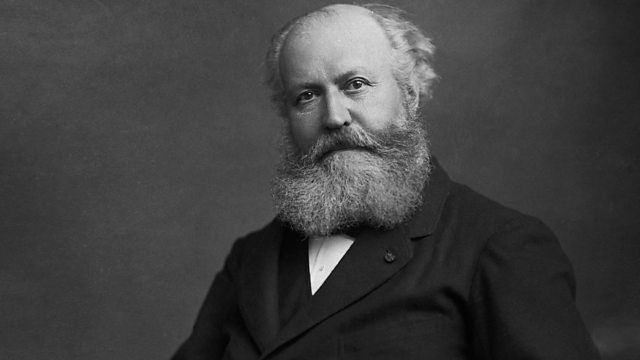
Mystic or Minstrel
Donald Macleod considers the reasons behind Charles Gounod's bid to become a theatrical composer and how his first opera, Sapho, was created.
Donald Macleod considers the reasons behind Charles Gounod's bid to become a theatrical composer and how his first opera "Sapho" was created.
The importance of Charles Gounod was readily acknowledged by the generations who succeeded him. A prolific composer, his contribution to song repertoire led Ravel to call him the "founder of the French melodie". Bizet, Massenet and Saint-Saens all took inspiration from his operas, while the body of religious music he produced is so substantial, it has yet to be properly assessed. Given his standing among peers it's perhaps unfair that his reputation faded so quickly after his death in 1893. In more recent times his reputation has recovered but still, rather unfairly, rests on a handful of works. This week, therefore, presents a rare chance to delve into the surprising breadth of Gounod's musical preoccupations.
Born in 1818 into an artistic family, Gounod found success early on in 1839 as a winner of the prestigious Prix de Rome competition. The years he spent in Rome as a consequence led to a life-long love affair with Italy. As a young man he considered taking holy orders, but his desire for success as a theatre composer won out in the end. While he continued to write music for the church, he went on to complete twelve operas, among them "Faust", "Mireille", hugely popular in its day, and "Romeo et Juliette".
After three happy years spent in Italy and Vienna, in 1843 Charles Gounod returned home to Paris. Initially he took up a position writing music for a church but it wasn't long before the lure of the stage proved irresistible.
Venise
Felicity Lott, soprano
Graham Johnson, piano
Kyrie from St Cecilia Mass
Czech Chorus, Prague
Czech Philharmonic Orchestra
Igor Markevitch, conductor
Symphony no. 2 in E flat major (1st movement)
Orchestra della Svizzera Italiana
Oleg Caetani, conductor
Sapho
Finale to Act 1
Katherine Ciesinski, mezzo soprano, Sapho
Alain Meunier, baritone, Alcée
Frédèric Vassar, bass, Pythéas
Eliane Lublin, mezzo soprano, Glycère
Alain Vanzo, tenor, Phaeon
Nouvel Orchestre Philarmonique
Radio France Chorus
Sylvain Cambreling, conductor
Tobie (excerpt)
Delphine Haidan, mezzo soprano, Anne
Fernand Bernadi, bass, Old Tobias
Chorus and Orchestra of Paris-Sorbonne
Jacques Grimbert, conductor.
Last on
Music Played
-
![]()
Charles Gounod
Venise for voice and piano
Performer: Graham Johnson. Singer: Felicity Lott.- Charles Gounod - Songs.
- Hyperion.
- 3.
-
![]()
Czech Philharmonic Chorus And Orchestra & Igor Markevitch
Kyrie (St Cecilia Mass)
- Gounod: St Cecilia Mass.
- DG.
- 1.
-
![]()
Charles Gounod
Symphony No 2 in E flat major (1st movement)
Performer: Orchestra della Svizzera italiana. Conductor: Oleg Caetani.- Gounod: Symphonies Nos. 1-3.
- CPO.
- 5.
-
![]()
Charles Gounod
Héros sur la tour solitaire (Sapho, Act 1)
Singer: Katherine Ciesinski. Singer: Alain Meunier. Singer: Frédéric Vassar. Singer: Éliane Lublin. Singer: Alain Vanzo. Orchestra: French Radio New Philharmonic Orchestra. Choir: Maîtrise de Radio France. Conductor: Sylvain Cambreling.- RPC 32453/54.
- Rodolfe Productions.
- 1.
-
![]()
Charles Gounod
Oui, du Seigneur la bonté tutelaire (Tobie)
Performer: Fernand Bernandi. Singer: Cécile Perrin. Singer: Delphine Haidan. Singer: Marc Duguay. Choir: Paris Sorbonne Choir. Orchestra: Paris-Sorbonne Orchestra. Conductor: Jacques Grimbert.- Marco Polo:8223892.
- Marco Polo.
- 8.
-
![]()
Charles Gounod
Ils ont dit vrai (Tobie)
Performer: Fernand Bernandi. Singer: Cécile Perrin. Singer: Delphine Haidan. Singer: Marc Duguay. Choir: Paris Sorbonne Choir. Orchestra: Paris-Sorbonne Orchestra. Conductor: Jacques Grimbert.- Marco Polo:8223892.
- Marco Polo.
- 8.
Broadcast
- Tue 12 Jun 2018 12:00����ý Radio 3
Beethoven Unleashed – the box set
What was really wrong with Beethoven?
Composers A to Z
Who knew? Five eye-opening stories from Composer of the Week
Five reasons why we love Parry's Jerusalem
What is the strange power of Jerusalem which makes strong men weep?
A man out of time – why Parry's music and ideas were at odds with his image...
The composer of Jerusalem was very far from the conservative figure his image suggests.
Composer Help Page
Find resources and contacts for composers from within the classical music industry.





